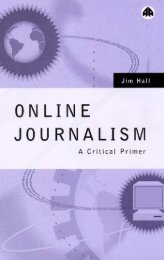Modul Mata Kuliah Journalisme Online - Ayo Menulis FISIP UAJY
Modul Mata Kuliah Journalisme Online - Ayo Menulis FISIP UAJY
Modul Mata Kuliah Journalisme Online - Ayo Menulis FISIP UAJY
Create successful ePaper yourself
Turn your PDF publications into a flip-book with our unique Google optimized e-Paper software.
online civility brought about by the millions of new creators and consumers of new media content, as<br />
those such as Andrew Keen are also quick to point out.<br />
However, the manner in he and others like Amanda Chapel (who strikes me as a woman tragically<br />
blinkered by her own genius) and Loren Feldman (who desperately needs to learn that the repetitive use<br />
of the f-word is no substitute for essentially vacuous commentary) flag the shortcomings of citizen<br />
journalism glaringly ignore the potential of new media, and citizens who find expression through new<br />
media, to change the dynamics of polity and society in countries such as Sri Lanka where as Nalaka<br />
Gunawardene pointed out in this blog, traditional mainstream media is mainly located in and published<br />
through just two urban locations, necessarily marginalising the aspirations, ideas and voices of those<br />
resident elsewhere in the country.<br />
Amanda Chapel however does raise a fundamental point – what is the economic basis of citizen<br />
journalism?<br />
You cannot have an economic system where half of it is not economic. You can’t have a boat with holes<br />
in it! You can’t have a store where you charge at the front door and customers take whatever they want<br />
out the backdoor for free. In short order, there will be NO paying customers. And without paying<br />
customers, you can’t make anything to sell or give away.<br />
Amanda is surprisingly oblivious to the spirit of the Free and Open Source software development<br />
community, the viability of products and services created through open source software development<br />
processes, or indeed, the spirit of volunteerism in general.<br />
That said, if citizen journalism initiatives are to scale up and become sustainable over the long-term,<br />
there exists a need to create multiple revenue streams, not just from advertising or donor funding. I<br />
believe there is an eventual market for the monetisation of citizen journalism content that based on say<br />
the ground-rules of content creation I’ve tried to foment in Groundviews, provided that mainstream<br />
media is willing to pay for and publish this content, advertisers are convinced that content is read by<br />
those with purchasing power for the products and services they seek to advertise and ordinary citizens<br />
themselves (based on through models of subscription that operate of scale rather than high-entry costs)<br />
see the benefits of subscribing to content that is geared to their interest and have a mix of local,<br />
national and global news, analysis and information. The last point would require, especially in countries<br />
like Sri Lanka, citizen journalism also engages with the mainstream media in order to tap into their<br />
distribution networks and broadcast footprints, which in turn requires a multi-media approach that isn’t<br />
solely based on accessing content online.<br />
This is an evolving debate, and through praxis (particularly in the Global South) and the thrust and parry<br />
of wit online, I look forward to an evolving understanding of how new media & new technology can<br />
support the basic democratic aspirations of all communities and peoples, irrespective of where they live,<br />
or who they vote for.<br />
Addition: Just came across Principles of Citizen Journalism, launched recently, which I think is essential<br />
(Posted by Sanjana Hattotuwa)<br />
http://ict4peace.wordpress.com/2007/04/15/auteurs-and-amateurs-the-debates-on-citizen-journalismcontinue/
















